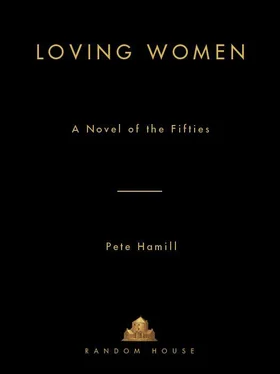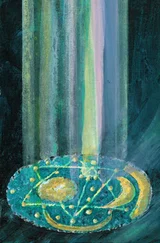She drove away in the chilly morning fog. I stumbled through the woods, heading for the hole in the fence, my head full of pictures that weren’t there a few days before: Bobby Bolden’s ruined hands with the music beaten out of them; Coincoin hunting bears in the dark woods and punishing her slaves; the Klan lashing at Catty’s flesh, eyes red from white lightning and fear; the old black man with the shotgun warning me off the land. Rage was everywhere: my own and the rage of others.
But most of all I was full of Eden Santana and The Story. My own small tale seemed puny by comparison to her tapestry of history, myth, forgotten languages, old crimes. How could she care for my own small ambitions, my little fairy tales of Paris and art, when she was one of the secret bearers of The Story? A few hundred feet from the base, I sat down in the dark with my back to a tree and started to cry.
I felt like such a goddamned fool. Why hadn’t I seen it? The clues were there from the moment I met her on that New Year’s Eve bus: the frizzy hair and the dark skin and the way she slurred certain words. I had refused to notice the absent things: pictures of family and children and friends. Drawing from photographs late at night, I arrogantly thought I understood the lives of other men from the evidence of wrinkled snapshots slipped from wallets. But I never clearly saw the woman who was there before me in all her nakedness. She didn’t have the black skin, broad nose or thick lips of a cartoon Negro. But Bobby Bolden must’ve seen what she was that time we picked him up in the rain. Maybe the blacks out by the lake always knew when one of their own kind was trying to pass in the white man’s world, and maybe they liked what they saw, knew she was making me hers as so many black women had done with so many white men across the centuries. But I would never know the answers to such questions and that’s what made me feel such a fool. I had made love to her and she to me; but James Robinson had gone there first. And I remembered Waleski’s maxim: I thought I fucked a colored girl until I saw a colored guy fuck a colored girl .
My body trembled, I shuddered, felt very hot, then cold. I tried to get angry, to use fury to force out the shame. Why didn’t she tell me? If she loved me, how could she keep such a secret from me? Was she waiting for some moment when she would sit me down and tell me and laugh at me, thus becoming my master, the owner of my broken pride? Did she make me love her as an act of revenge? But wait, I thought: you wanted her to keep some secrets. You told her that her secrets would keep you loving her for the rest of your life. That’s what you kept saying to her, right? So how can you get angry for going along with your desire? You want secrets, and then you learn a big secret and first get sick and then get angry. Come on .
But then I knew that I wasn’t crying simply because I felt shame or had been fooled. I was sobbing in the empty woods because everything I wanted to do with Eden Santana now seemed impossible. Say it straight, I said. And spoke out loud: How can I ever marry a nigger? Saying the word. The word that I knew had broken Bobby Bolden’s hands and sent the Klan to hang women from trees. I’d thought of myself as the hip New Yorker, who knew all about Charlie Parker and Max Roach and Billie Holiday, and here I was, saying the word. Nigger , I said out loud. You’re a nigger, Eden . And saw myself walking the streets with her nigger kids and our own kids with a touch of nigger in them. And people would stop us in restaurants and say, Hey, no niggers here, pal . And no niggers in this school. And sorry, but ain’t no room in this bus, you’ll have to sit up front, sailor , and put your nigger woman in the back.
Nigger, I said to the cold woods.
Nigger nigger nigger nigger nigger nigger nigger nigger nigger nigger nigger nigger nigger .
The word lost all meaning and I stood up, walking slowly now, drying my tears on my jumper. And new pictures formed in my head. I saw myself in New Orleans, sitting in the parlor with Eden’s parents, the two of them looking at me the way that old man had looked at me when I went to cut down Cathy; his eyes cold and his shotgun cradled in his arms. There were photographs of The People on the mantel. The parents were looking at me very hard and saw that I was young. They stared at my Navy uniform and my poorly shined shoes and made their own labels, their own categories, and placed me in the bin for poor white trash. Her children were in the next room, closer to my age than Eden was to mine, the two of them coal black staring at the white boy and wondering how he could ever be their daddy. That vision made me laugh. But then I imagined Harrelson seeing us strolling together down Pala-fox Street on our way to Mass at the Catholic church. I saw him smirking. Heard him say something about pickaninnies. And then suddenly knew: It was Harrelson tipped off the Klan .
Of course.
It had to be him.
He’d seen us that day. Coming up out of the side road from the lake, going to the highway.
Harrelson.
You prick.
And then I began to hurry, brushing aside branches and pushing through wet shrubs. I found the hole in the back fence and slipped through. It was almost four in the morning. I moved through the emptiness of the landing strip, staying in the dark, then hugged the sides of hangars. I slipped into the barracks and went straight to Harrelson’s bunk.
He wasn’t there.
I felt cheated. I wanted to hurt him. I wasn’t going to waste time in any court of law. I knew and I was going to punish the son of a bitch. But goddamnit, he wasn’t there.
I got into bed and lay there trembling for a long time. In one night, my whole world had changed and I didn’t know how I was going to live in it.
I never saw Bobby Bolden again. The scuttlebutt came in from Mainside about how they treated him at the hospital, his hands broken, ribs smashed, jaw fractured. The first morning, we heard about his concussion and how the brass came to talk to him about what happened and how Bobby Bolden told them to go away. We heard about how they stationed a Marine guard at his door, who turned away all visitors. Later we saw two MPs come to the Kingdom of Darkness and pack Bobby’s gear, taking everything with them, including the horn. Before the day was over, we heard they had flown him to Norfolk: out of Ellyson, out of Mainside, out of Pensacola, out of the South, and out of our lives.
We heard about Catty too. How they’d cleaned up her wounds and wired her broken shoulder and bandaged her ribs where someone had kicked her; how they’d listened to her as she made official statements; how the Navy brass had secured her hospital room too and then turned their backs as they transferred her to San Diego. They were shipping her as far from Bobby Bolden as they could send her. And as far as possible from anyone who might demand to know what had been done to her that night.
I was still so young that I was shocked when I discovered that there wasn’t a word about it in the Pensacola newspaper. As far as the paper was concerned, it had never happened. I called Maher in the administration building, since yeomen knew what was going on better than the officers did, and asked him why there was nothing in the newspaper. He was busy, but he said he’d try to find out. Twenty minutes later he called me back to say that it was very simple: the beatings had never been reported to the Pensacola police. And if there was no police report, the newspapers would never know.
“Why don’t we call the newspapers?” I said.
Читать дальше












